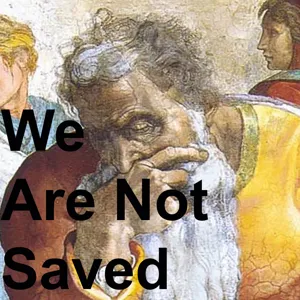La nuova frontiera del Nucleare (di Massimo Lapenda)

Explore "fermi" with insightful episodes like "La nuova frontiera del Nucleare (di Massimo Lapenda)", "Sommes-nous seuls dans l'univers ?", "Fermi Paradox and Drake Equation - Season 5 Episode 15", "The Fermi Paradox | Case File 223" and "What “The Expanse” Can Teach Us about Fermi’s Paradox" from podcasts like ""ANSA EconoMIA", "Faut qu'on en parle !", "All Things Space", "Alien Theorists Theorizing" and "We Are Not Saved"" and more!


Depuis la nuit des temps, l’Homme se demande si une autre vie n’existerait pas ailleurs ? Y’a-t-il que sur la Terre que cette dernière a pu se développer ?
L’univers est très grand… On entend de plus en plus qu’il est impensable que la vie soit apparue que sur Terre ? La vie a-t-elle pu émerger sur une exoplanète ? Peut-on aujourd’hui avouer qu’il y a une vie ailleurs ? Comment réagirions-nous ?
Aujourd’hui, on sait qu’il existe une cinquantaine d’exoplanètes semblables à la Terre. Ont-elles pu ou pourraient héberger la vie ? Si ce n’est pas de la vie humaine, a-t-on déjà pu observer du semblable ? Proxima B est l’exoplanète la plus ressemblante à la Terre et ne se trouve qu’à 4 années lumières de notre planète. Pourrions-nous bientôt s’y rendre ?
Y’a-t-il de la vie ailleurs ? Les extraterrestres et ovni existent-ils vraiment ? La vraie question… Sommes-nous seul dans l’Univers ? Pourquoi l’être humain cherche-t-il absolument à avoir cette réponse ? Enfin, leur existence n’obligerait-elle pas à repenser notre place dans le cosmos ? Nos spécialistes répondront à vos questions.
AVEC
- Michel VISO – Ex Responsable de l’Exobiologie au CNES pendant plus de 17 ans et conseiller Scientifique chez Innovaxiom
- Alexandre SANTERNE – Astrophysicien au Laboratoire d’Astrophysique de Marseille et à l’université d’Aix-Marseille
- Louis d’HENDECOURT – Directeur de Recherche au CNRS, Université Aix-Marseille et Institut Origines
- Pierre TAXIL – Physicien théoricien, professeur émérite à l'université d'Aix-Marseille
- Olivier MOUSIS – Astrophysicien et Directeur de l’Institut Origines
- Jacques ARNOULD – Expert en éthique spatiale au CNES
Abonnez vous à notre chaîne sur YouTube : https://www.youtube.com/c/fautquonenparle
Notre site : https://www.fautquonenparle.fr/
Rejoignez nous sur Facebook : https://www.facebook.com/fautquonenparle/
Suivez nous sur Twitter : https://twitter.com/fautquonenparle
Toutes les coulisses de notre émission sur Instagram: https://www.instagram.com/fautquonenparle/
#fqep #debat #talkshow #espace #univers #fermi #darwin #radio #extraterrestre #planete
Soutenez-nous sur PayPal !



The ninth book and sixth season of The Expanse were both just released. I haven't watched much of the TV show, but I did just finish reading the final book and as I did so it occurred to me that the way it handled Fermi's paradox might provide a useful way of understanding my own fixation on it. And why I think it presents a huge challenge to anyone who thinks that humanity is on an unending upward slope that will eventually take us to the stars.


I discussed Fermi's Paradox in my last newsletter. In this I discuss the hint it provides that technology may be inevitably linked to extinction. That the reason the universe is not teeming with aliens is that the technology to get to that point presents insuperable risks which cannot be overcome.
As I said this is a hint, but I think it's a hint we need to take seriously.

The massive attention being paid to UFOs in the form of the Pentagon/Naval videos has rekindled interest in the subject and by extension interest in Fermi's Paradox. I think people's interest in these subjects is entirely too trivial. Treating it as a curiosity rather than one of the most important indications of what the future has in store for humanity — either eventual doom or being terribly alone.




Scott Alexander of SlateStarCodex recently declared that "nobody ever really believed [that Fermi's Paradox] was a problem. I not only believed it was a problem I still believe it's a problem, and I think everyone else should as well. If you're one of those who don't think it is, then this episode is designed to change your mind.


In this installment of the Future Grind podcast, host Ryan O’Shea speaks with Dr. Anders Sandberg. Anders is currently a research fellow with the Future of Humanity Institute at the University of Oxford. His research focuses on global catastrophic risk, cognitive enhancement, collective intelligence, neuroethics, public policy, and much more. Anders serves as an advisor to Humanity Plus, and has a background in computer science, neuroscience and medical engineering. He obtained his Ph.D. in computational neuroscience, which focused on neural network modeling of human memory, from Stockholm University in Sweden, which is the country he is originally from.
In this wide ranging conversation they discuss existential risks, the possibility of alien life, the vulnerable world hypothesis, and much more.
Show Notes: https://futuregrind.org
Subscribe on iTunes: https://itunes.apple.com/us/podcast/future-grind-podcast-science-technology-business-politics/id1020231514
Support: https://futuregrind.org/support
Follow along -
Twitter - https://twitter.com/Ryan0Shea
Instagram - https://www.instagram.com/ryan_0shea/
Facebook - https://www.facebook.com/RyanOSheaOfficial/
If you have any questions or are interested in supporting or sponsoring Future Grind, you can reach us at hello@futuregrind.org.


Milan M. Ćirković's book The Great Silence is a fantastic exploration of the philosophy and importance of Fermi's Paradox. I spend the first half of this episode doing a review of the book and the second half discussing how my own explanation of the paradox fits in to Ćirković's framework.

Nietzsche claimed that "God is dead", and predicted that as this became apparent the world would descend into nihilism. But what if there are god-like extraterrestrials out there? Or what if we can create our own gods using AI? How does that change his prediction of nihilism? The question seems to depend on whether there is some universal system of morality. If not, I argue, the consequences will be every bit as bad as Nietzsche predicted.

Today on the 5: Over the years there have been multiple ideas presented as a possible answer to the Fermi Paradox. More and more, I wonder if we're just among the first creatures to evolve as far as we have.

I introduce the idea of "The Mistake of Dramatic Timing" which affects most of the thinking about Fermi's Paradox. I review a particularly egregious example of it in the Bobiverse series. I then go on to discuss my issues with a recent paper which claimed to "Dissolve Fermi's Paradox".

Stay up to date
For any inquiries, please email us at hello@podcastworld.io